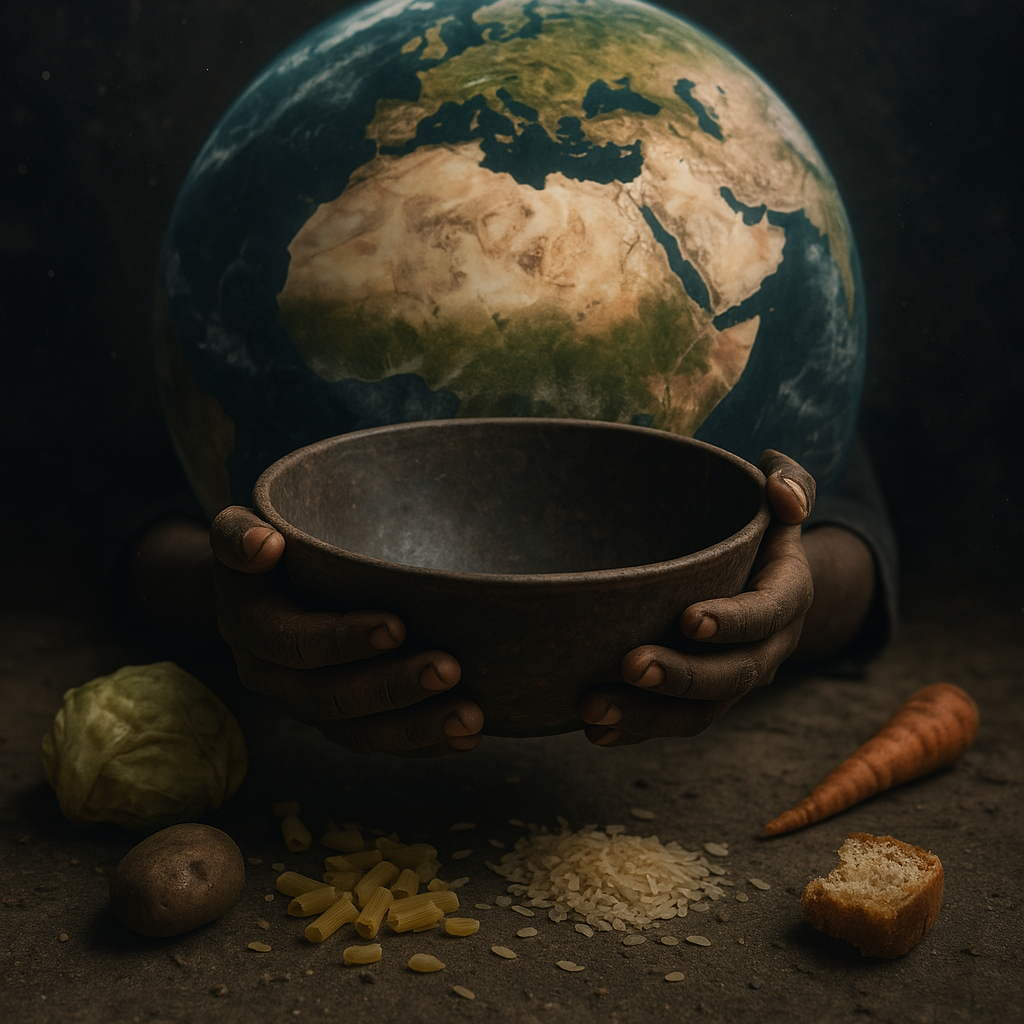
In a parallel world, the global food crisis continues to deepen, driven by a confluence of factors including a severe fertilizer shortage, unprecedented extreme weather events, and escalating geopolitical tensions. Experts warn that the situation is rapidly spiraling out of control, potentially leading to widespread famine and social unrest across multiple continents.
The fertilizer shortage, stemming from the ongoing conflict in Ukraine and subsequent sanctions, has crippled agricultural output worldwide. Ukraine and Russia are major exporters of key fertilizers like potash, ammonia, and urea, and the disruption of their supply chains has sent prices skyrocketing. Farmers in developing nations, already struggling with limited resources, are finding it increasingly difficult to afford the necessary inputs to cultivate their crops. This has led to a dramatic reduction in yields across a wide range of staple foods, including wheat, corn, and rice.
Adding to the crisis is the escalating impact of climate change. This year has seen a record number of extreme weather events – devastating droughts in East Africa, unprecedented floods in South Asia, and intense heatwaves across Europe and North America. These events have not only destroyed existing crops but also rendered vast swathes of arable land unusable. The combination of fertilizer shortages and extreme weather has created a perfect storm, pushing millions more people towards starvation.
The UN’s Food and Agriculture Organization (FAO) released a stark report earlier this week, painting a grim picture of the current situation. The report highlighted that food insecurity has increased dramatically in the past year, with an estimated 345 million people now facing acute food shortages. This represents a 40% increase compared to the previous year and is the highest figure recorded in a decade. The report warned that the situation is likely to worsen further in the coming months, unless drastic action is taken.
The escalating geopolitical tensions further exacerbate the crisis. Trade restrictions and export bans, implemented by several countries to protect their own food supplies, have severely disrupted global food markets. This protectionist approach, while understandable given the severity of the situation, has ultimately worsened the crisis by limiting access to essential food supplies for vulnerable populations. The resulting price hikes have disproportionately impacted the poorest and most marginalized communities.
The FAO’s report calls for immediate and coordinated international action to address the crisis. The report outlines a series of recommendations, including:
Increased investment in sustainable agricultural practices:
Shifting towards more resilient and climate-smart agriculture is crucial to mitigate the impacts of climate change and improve food security in the long term. This includes promoting drought-resistant crops, improving water management techniques, and reducing reliance on chemical fertilizers.
Strengthening global food supply chains:
Investing in infrastructure and logistics to ensure efficient and reliable food distribution is critical. This includes improving transportation networks, reducing trade barriers, and strengthening regional food security initiatives.
Increased humanitarian aid:
Urgent and substantial humanitarian assistance is needed to provide immediate relief to those most affected by the food crisis. This includes providing food aid, nutritional support, and access to clean water and sanitation.
Addressing the root causes of conflict:
Resolving conflicts and promoting peace and stability are essential to ensuring access to food and resources for all. This requires a concerted effort from the international community to address the underlying causes of conflict and promote inclusive governance.
Promoting fair trade practices:
Ensuring fair prices for farmers and equitable access to markets is crucial to incentivize sustainable agricultural production and improve food security. This includes supporting smallholder farmers and promoting fair trade certification schemes.
The global community faces a critical juncture. The current food crisis is not just a humanitarian catastrophe but also a threat to global stability and security. Failure to address this challenge effectively could have devastating consequences, leading to widespread social unrest, mass migration, and even conflict. The urgent need for collaborative, coordinated, and decisive action is undeniable. The coming months will be crucial in determining whether the international community can rise to the challenge and avert a global food catastrophe.
Regional Impacts:
The impact of the global food crisis is not uniform. Certain regions are experiencing particularly acute levels of food insecurity:
The Sahel Region (Africa):
Devastating droughts have decimated crops and livestock, leaving millions facing severe hunger and malnutrition. Conflict and instability further complicate the situation, hindering access to humanitarian aid and exacerbating food insecurity.
The Horn of Africa:
Similar to the Sahel, the Horn of Africa is grappling with a severe drought that has pushed millions to the brink of famine. The region is already highly vulnerable to climate change and conflict, making it particularly susceptible to food crises.
South Asia:
Unprecedented floods have submerged vast areas of agricultural land, destroying crops and disrupting food supply chains. The resulting food shortages have led to sharp price increases and widespread hunger.
Central America:
Recurring droughts and hurricanes, coupled with the global fertilizer shortage, have significantly reduced agricultural yields, impacting food security across the region.
Economic Consequences:
The food crisis is not only a humanitarian issue but also a major economic challenge. Soaring food prices are fueling inflation, pushing millions more into poverty, and destabilizing economies worldwide. The World Bank has warned that the crisis could push an additional 100 million people into extreme poverty. The knock-on effects on global trade and economic growth are likely to be profound.
Calls for Action:
Numerous organizations, including the FAO, the World Food Programme (WFP), and various NGOs, are calling for urgent and coordinated international action to address the crisis. They are urging governments, international organizations, and the private sector to work together to increase food production, improve food distribution, and provide humanitarian assistance to those most in need. The challenge is immense, but the consequences of inaction are far greater. The world must act decisively and collaboratively to avert a global food catastrophe and safeguard the future of billions. The time for decisive action is now.